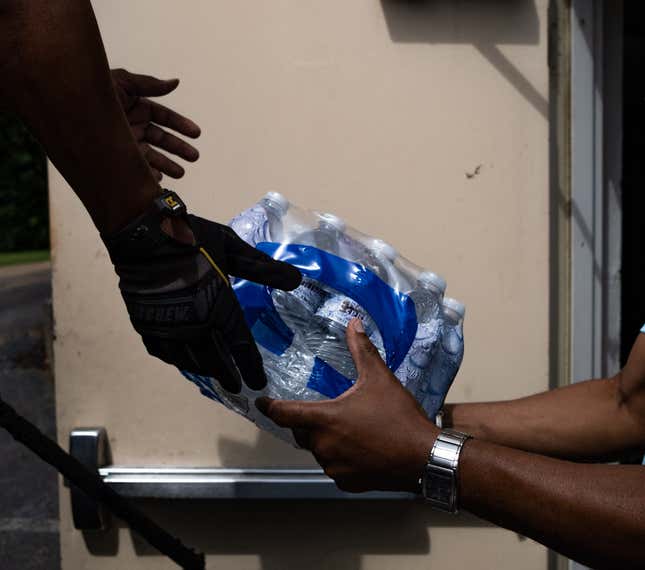
It’s been weeks since residents of Jackson, Mississippi have had access to safe drinking water.
“It’s frustrating, it’s humiliating. But for me, I can survive…I think about those who are worse off than me,” says Danyelle Holmes, 48, as she hands out bottled water at a local distribution site.
The distribution site set up by Holmes’ group, the Mississippi Rapid Response Coalition, is working overtime to ensure vulnerable residents of the majority Black city have access to clean water.
“A lot of these folks can’t get out of their homes to get to water sites,” she says. “They don’t have access to or know how to call to get water delivered to them. And so we’re just having to check out the city to make sure that we’re reaching everyone.”
The water crisis in Jackson isn’t new, says Sacoby Wilson, a Professor of Environmental Justice at The University of Maryland School of Public Health.
Just last year, a winter storm knocked out the city’s water supply causing a similar crisis. But, Wilson says that climate change will make things much much worse.
“Folks of color, we’ve already been impacted by poor infrastructure and environmental hazards,” says Wilson. “We’re going to feel the effects of climate change, and we’re gonna feel it first.”
What happened in Jackson is a clear example of what happens when a lack of investment in Black communities bumps up against the reality of climate change, says Wilson.
The city, which is over 82 percent Black, has had a crumbling infrastructure for decades. So it’s no wonder that every time there’s a severe weather event like the snow storms last year or the heavy rainfall this year, the city’s water system can’t handle it.
In August, heavy rainfall flooded the Pearl River causing the fifty-plus-year-old O.B Curtis water treatment plant to fail. And although the water is back on, because of bacteria that builds up when water pressure is low, it’s still not safe to drink.
As climate change worsens, experts predict that these types of storms and severe rainfall events are going to become more common.
A 2020 report from the UN Office for Disaster Risk Reduction estimated that as global temperature rises, we’re going to have more frequent natural disasters and severe weather events.
And at the moment, our systems aren’t set-up to handle these events, especially in Black and lower-income communities that have been disinvested in, like Jackson, Mississippi and Flint, Michigan, says Wilson.
“You have old infrastructure. You have systemic racism, and you have climate change, all coming together,” says Wilson.
Addressing what’s happening in Jackson and cities like it would require making meaningful investments in infrastructure in Black and lower-income communities, says Catherine Flowers, founder of the Center for Rural Enterprise and Environmental Justice.
“[The government] needs to start investing in research and development for more resilient systems,” says Flowers. “All of these structural inequities that have led to benign neglect of investment in communities that are Black, Brown, and poor need to be removed.”
Black folks who care about these issues in their community need to be prepared to fight for them politically, says Flowers.
“We need to register to vote. And we need to turn out and vote. No matter how long it takes,” says Flowers. “We also need to vote for people who are willing to change these policies that have enabled these inequities.”
And according to Flowers, that means investigating politician’s donors and paying attention to who is actually making policies to address climate change and environmental racism.
“We have to build resilience, but we also have to reduce our emissions. You have to do both, it’s not an either or,” says Flowers. “Because either can lead to death for all of us.”
Wilson says that making sure the climate infrastructure dollars included in the new Inflation Reduction Act go towards Black communities is also incredibly important.
“We have to work to make sure that folks who are disadvantaged who are dealing with environmental deficits get those dollars,” says Wilson. “We have to push on legislators… federal agency partners, the EPA, Health and Human Services, and HUD.”
The Mississippi Governor’s office did not respond to requests to comment.
In Jackson, Holmes isn’t sitting around waiting for climate change to make the crisis worse. In addition to ensuring residents have access to clean water, Holmes is committed to informing residents and lawmakers about climate change.
“If we don’t talk… about what happened in Jackson and climate change, we’re going to be doomed,” says Holmes. “We can’t avoid the conversation any longer about the impact that climate change is having on poor communities in the United States.”

